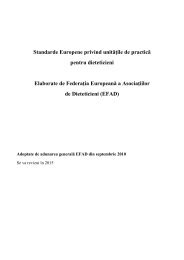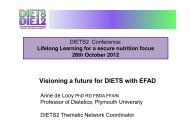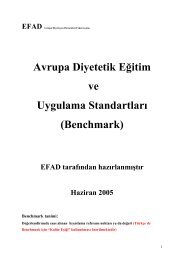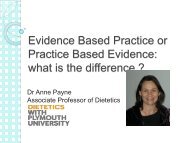European Dietetic Advanced Competences (EDAC) - Diets
European Dietetic Advanced Competences (EDAC) - Diets
European Dietetic Advanced Competences (EDAC) - Diets
Create successful ePaper yourself
Turn your PDF publications into a flip-book with our unique Google optimized e-Paper software.
DIETS WP2 (2012-07-05).<br />
An advanced practice or specialist dietitian will be one who is able to demonstrate they meet the advanced competence standards by drawing on<br />
a wide range of evidence. The evidence can be gained from professionally recognized programmes of study, for example a degree at Masters<br />
level or equivalent, or by using a competency-based assessment process. Other approaches may also be used to demonstrate commitment to<br />
evidence-based practice to meet the advanced competence standards.<br />
Exactly which of the competences described in this <strong>EDAC</strong>-document a dietitian has to reach and which performance indicators (PIs) they have to<br />
be able to show before being regarded as working at advanced level will be determined by their National <strong>Dietetic</strong> Associations (NDAs) and<br />
national legislation. The <strong>EDAC</strong>-document also provides a benchmark for monitoring development of the profession in Europe as opportunities are<br />
introduced for Lifelong Learning. It also presents a challenge to Higher Education, the Professional Bodies and individual learners to consider how<br />
they can support, through educational programmes and more informal means, the advancement of their colleagues, learners and themselves.<br />
Acknowledgment<br />
The authors of this paper gratefully acknowledge the use of several competence statements from the publications listed at the end of this paper.<br />
Glossary of terms<br />
<strong>Advanced</strong> practice<br />
(practice at<br />
advanced level)<br />
<strong>Advanced</strong><br />
practitioner/specialist<br />
<strong>Advanced</strong> practice can take place in either a general or a specialist field. Terms associated with advanced practice are<br />
„higher levels of knowledge and skill‟, „significantly more demanding‟, „higher levels of responsibility and judgment‟, „more<br />
complex procedures‟ etc. <strong>Advanced</strong> practice is underpinned by advanced reasoning.<br />
<strong>Advanced</strong> practice results from an expanded and specialized knowledge set, skills, competence, and experience.<br />
Expansion refers to the acquisition of new practice knowledge and skills, including the knowledge and skills that<br />
legitimize role autonomy within areas of practice that may overlap the traditional boundaries within dietetics practice.<br />
<strong>Advanced</strong> level practice is characterized by the integration of a broad range of unique theoretical, research-based, and<br />
practical knowledge that occurs as a part of training and experience beyond entry level and is shaped by the context in<br />
which the dietitian practices (ADA).<br />
Denotes a level of practice, often within a specialty, that is more advanced than the competences associated with initial<br />
registration, or with simply working in a specialty requiring different approaches (e.g. primary care at community level,<br />
elder care, rehabilitation homes or in hospital). The specialist‟s role encompasses professional expertise, teaching,<br />
evaluation and practice/service development. In some countries in Europe a title Specialist Dietitian has been proposed<br />
or implemented for dietitians working as advanced practitioners in an area of specialisation. A specialist may also be<br />
considered an expert.<br />
4







